Delta88 Chess
There are three regular shapes that tile the plane, square, regular
hexagon and equilateral triangle. Of these the triangle is very
much the poor relation in its use in CVs. I am investigating this
poor relation, the Trigonal Board, and using the
Chessvariant
Wiki to record my thoughts. This variant is
based upon that work and is intended to translate the FIDE pieces to a
trigonal board in a conservative way; retaining a FIDE feel while
adding just a twist of triangular versatility.
Setup
| The board is constructed from 88
equilateral triangles (trigons or trigs) arranged in 8 ranks of
11 files. Each player has 22 pieces consisting of:
|
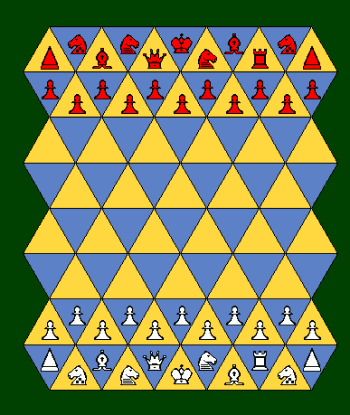 |
Pieces
|
King
The King may move a single step to any one of the 12 adjacent trigs provided that trig is safe (not atttacked by an enemy piece). In the image on the right these 12 adjacent trigs are indicated by orange dots for the white king on the blue trig; and by blue dots for the white king on the yellow trig. The King may also castle by moving 3 steps towards one of the Spires, which Spire then leaps to the trig just beyond the King. In the image, the red king will finish its castle move on the trig with a red dot, while the spire will finish on the trig with a black dot. |
 |
|
Queen
(Spire + Bishop)  |
Tower
 |
Spire |
Bishop  |
Knight-Errant  |
Knight-Paladin 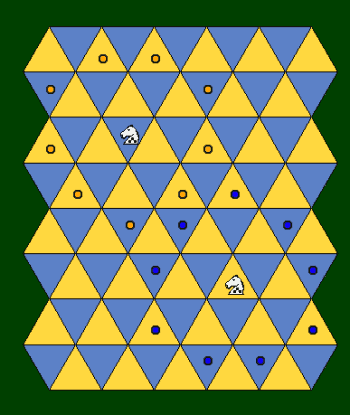 |
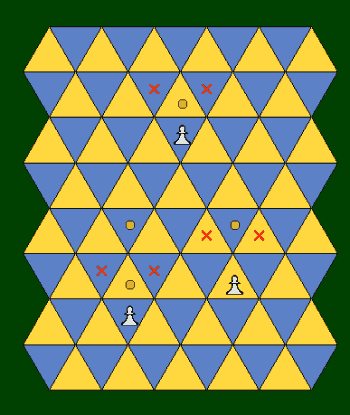 |
Pawn Pawn movement is shown by the image on the left.
A pawn may move 1 trig directly forward to a trig of a different colour. On its first move a pawn may move an optional second step. When moving directly forward the pawn may not capture and may not leap over other pieces. These moves are shown by orange dots. Pawns capture by moving forward to a trig of the same colour. These captures are shown by red crosses. En-Passant capture is allowed. Pawns promote on reaching the far-most rank. |
Rules
Unless stated otherwise, the rules of FIDE chess apply.
There are two players, White and Red.
Turns, consisting of moving a single friendly piece, alternate between the players with White going first.
Notes
Piece Values
Initial guestimates:
- Pawn -------------- 1.0
- Knight-Errant ----- 3.0
- Knight-Paladin ---- 3.0
- Bishop ------------- 5.0
- Spire -------------- 6.0
- Tower -------------- 10.5
- Queen -------------- 11.5
Motivation
My primary interest when designing CVs (or any board game) concerns the board itself. The topology of the playing arena is what fascinates me: its shape, the shape of its cells, and the connections between those cells. I freely admit that I have little interest in the pieces beyond the challenge of assigning them relative values within a given game. The continued creation of fanciful fairy constructs leaves me somewhat puzzzled and bemused, struggling to understand and to answer my own unspoken "Why?". This is not a criticism of the piece proliferators; the fault, if any fault there be, is entirely mine: it is merely a statement of my own peculiar paradigm and a pointer to the motivation behind the genesis and design of this variantEquivalent Hex Board
(from an idea by Joe Joyce)| The trigonal board
presented in the above description can be replaced by an
hexagonal-lattice (hex-lat) board; an hexagonal board where every third
hexagon is removed. Such a board is illustrated in the two images
below. The equivalence to a trigonal board is shown in the left image where the hexagons can be seen to be the central part of a trig and the missing hexes occur where the points of the trigs have been removed. The trigonal edge-step remains an edge step on the hex-lat and is illustrated on the image by a green line. The point-steps on the hex-lat follow the pink lines with the missing hexes acting as the trigonal point connections. The right image below shows the starting array for Delta88 Chess using the hex-lat board. |
|
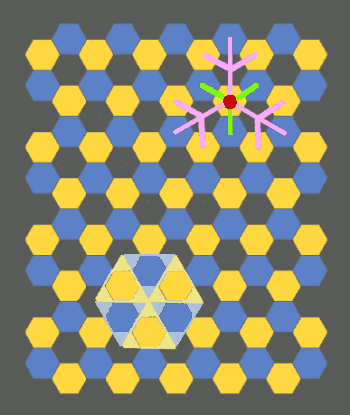 |
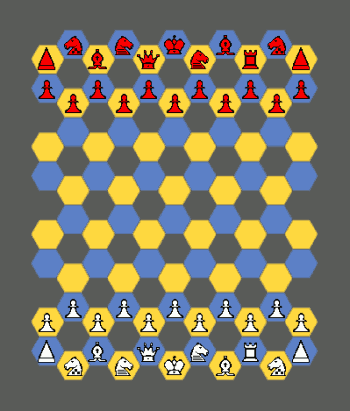 |
The pieces and their movement on this hex-lat board are shown below, the
reachable cells being marked with a red star (or a blue star in the case of a pawn's capturing move).
The images used were produced from the Game Courier Preset
King |
Queen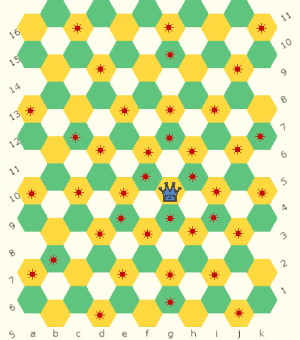 |
Tower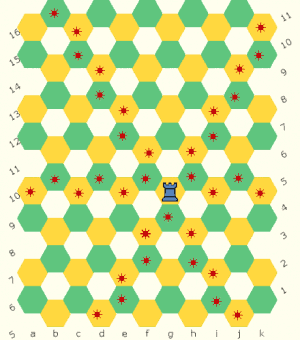 |
Spire |
Knight Errant |
Knight Paladin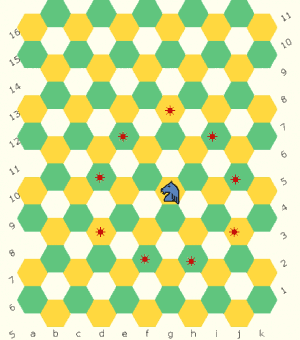 |
Bishop |
Pawn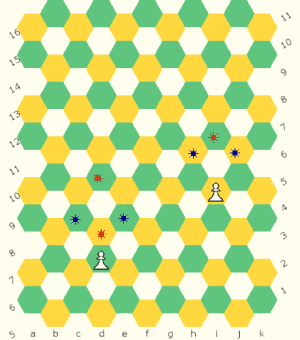 |
 This 'user submitted' page is a collaboration between the posting user and the Chess Variant Pages. Registered contributors to the Chess Variant Pages have the ability to post their own works, subject to review and editing by the Chess Variant Pages Editorial Staff.
This 'user submitted' page is a collaboration between the posting user and the Chess Variant Pages. Registered contributors to the Chess Variant Pages have the ability to post their own works, subject to review and editing by the Chess Variant Pages Editorial Staff.
By Graeme C Neatham.
Web page created: 2007-08-18. Web page last updated: 2008-06-27
